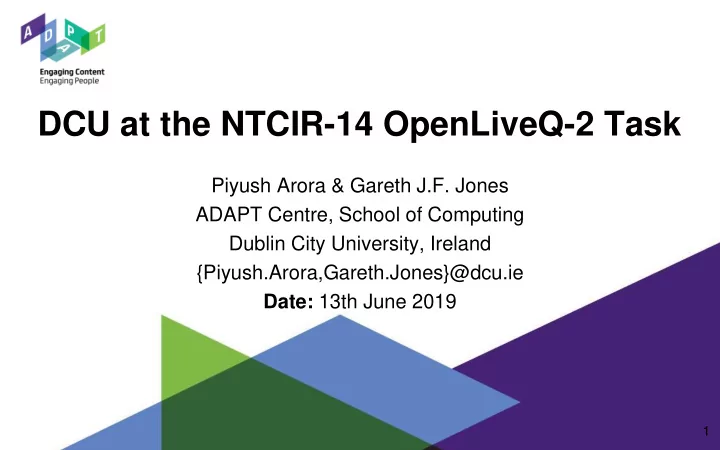

DCU at the NTCIR-14 OpenLiveQ-2 Task Piyush Arora & Gareth J.F. Jones ADAPT Centre, School of Computing Dublin City University, Ireland {Piyush.Arora,Gareth.Jones}@dcu.ie Date: 13th June 2019 1
Outline www.adaptcentre.ie ● Task Overview ● Methodology ● Experiments ● Results ● Analysis ● Findings & Future Work 2
Task Overview www.adaptcentre.ie ● Task: Rank a list of Japanese language questions matching a user’s query ● Dataset: Yahoo queries and respective question-answers ● Goal: Effectively model information from the user click logs and relevance based metrics ● Evaluation: ○ Offline evaluation: metrics such as NDCG, ERR ○ Online evaluation: live Yahoo question answering platform 3
Snapshot www.adaptcentre.ie 4 Original Japanese page translated using the Google translation
Challenges www.adaptcentre.ie ● Queries are typically short and ambiguous in nature and might not capture the user’s intention effectively ● For “ 喫煙 ”, example for Japanese query: English translation: “smoking”, can have multiple intentions: “dangers of smoking” “smoking health effects” “mechanism to quit smoking” ● Without understanding the user’s intent and focus of the query, it becomes challenging to re-rank the questions ● Aim: Model textual based information and click logs based information to re-rank questions effectively 5
Learning To Rank Problem www.adaptcentre.ie Image Source: https://medium.com/@nikhilbd/intuit ive-explanation-of-learning-to-rank- and-ranknet-lambdarank-and- 6 lambdamart-fe1e17fac418
Resources and Tools www.adaptcentre.ie ● Resources provided by the task organizers: ○ Pipeline for processing Japanese text ○ Pipeline for features extraction ○ Data set and click logs ● Used Lemur RankLib toolkit ● Total of 77 features 7
Content based features www.adaptcentre.ie Question Features Features Title tf_sum tf_in_idf_sum & log_tf_sum bm25 Question norm_tf_sum log_bm25 Body log_norm_tf_sum lm_dir idf_sum lm_jm Snippet log_idf_sum lm_abs icf_sum dlen Body log_tfidf_sum Answer log_dlen tfidf_sum 8
Click log based features www.adaptcentre.ie Features answer_num log_answer_num view_num User log_view_num Logs is_open is_vote is_solved rank updated_at 9
Methodology www.adaptcentre.ie ● Learning to Rank (L2R) algorithms: ○ Coordinate Ascent ○ MART ● Feature Selection & Combination: ○ Alternative combinations of the 5 feature set ● Parameters optimization ● Scores Normalisation: ○ Z-score normalization ○ Score average ○ Max based normalization 10
Dataset www.adaptcentre.ie Training set Test set Number of Queries 1,000 1,000 Number of Questions 986,125 985,691 Number of click logs 288,502 148,388 11
Our Submissions www.adaptcentre.ie ● Total of 14 systems submitted ● Overall 65 participant submissions ● All 65 submissions evaluated & ranked using ○ NDCG@10, ERR@10, Q measure ○ Phase-1 online evaluation ● Top 30 systems selected for final online evaluation ● 5 of our systems selected in top 30 systems 12
Results www.adaptcentre.ie 13
Best Models www.adaptcentre.ie 14
Systems Ranking www.adaptcentre.ie Online Evaluation Final Online Systems ID NDCG@10 ERR@10 Q-Measure Phase-1 Evaluation System-2 106 32 24 26 7 7** System-4 112 36 35 64 8 10 System-5 118 45 38 65 4 6** System-7 126 34 34 32 14 12 System-12 147 21 23 20 29 23 ** No significant differences between the top scored runs using Tukey’s HSD tests 15
Analysis www.adaptcentre.ie ● Coordinate Ascent algorithm performs relatively better than the Mart algorithm ● Our best system (ID-130) based on NDCG@10 and ERR@10 was ranked “2” and “3” respectively ● Based on Q-scores our best system (ID-123) was ranked “6” ● Based on the cumulative credit our best system (ID-118) was ranked “4” and “6” for online phase -1 and final phase evaluation ● Most of our submissions were heavily tuned to focus on relevance-based features (for e.g BM25 and LM scores) 16
Findings & Future Work www.adaptcentre.ie ● Ranking of systems based on the online evaluation metric differed from that for the offline evaluation metrics ● Need for more research to understand the factors behind contrary ranking results arising from the use of online and offline evaluation metrics ● Our best systems in the online phase focused on modelling users click logs ● Future work: explore more effective techniques for the exploitation of user logs and click distributions for ranking questions 17
18
Q/A www.adaptcentre.ie Acknowledgement: ● NTCIR’ 14 Organizers ● Task Organizers of NTCIR’ 14 OpenLiveQ-2 ● Yasufumi Moriya from the ADAPT centre 19
Recommend
More recommend